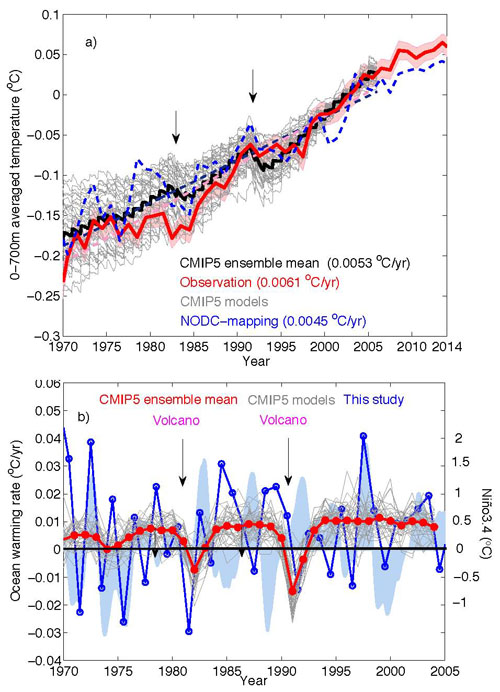A new study by Institute of Atmospheric Physics (IAP) proposed a new estimate on upper 0-700m ocean warming rate from 1970 to 2014: 0.55 ± 0.14 × 1022 J yr−1 (168TW). This estimate indicates a quicker upper ocean warming than previous estimates (i.e. the Intergovernmental Panel on Climate Change Fifth Assessment Report, IPCC-AR5)
Ocean heat content (OHC) change contributes substantially to global sea level rise (30%~50%), and provides a key metric for the earth’s energy budget (90% of the earth’s energy imbalance is stored in the ocean), so it is a vital task for the climate research community to estimate historical OHC. While there are large uncertainties regarding its value. IPCC AR5 provided five independent estimates of historical OHC change from 1970 to 2010 by five different international groups ranging from 74TW~137TW. Among these values, the minimum is as much as a half of the maximum, implying large divergence in the assessment of the ocean warming rate. That’s because there are several major error sources during OHC estimation.
Dr. CHENG Lijing, Prof. ZHU Jiang from IAP published a series of studies examining and quantifying the error sources in OHC estimates, including (1). Systematic biases in ocean temperature observations: expendable bathythermograph (XBT) data (Cheng et al. 2014); (2) Insufficient vertical resolution of historical temperature profiles (Cheng and Zhu, 2014a); (3) choosing a proper climatology (4) how to infill the data gaps (Cheng and Zhu, 2014b). These improvements lead to a new reconstruction of historical upper (0–700 m) OHC change, which is presented in this study as the Institute of Atmospheric Physics (IAP) version of historical upper OHC assessment.

Figure 1 (a) Upper (0–700 m) OHC, calculated using 40 Coupled Model Intercomparison Project, Phase 5 (CMIP5) models (historical run) (gray lines; black line is the ensemble mean). The CMIP5 results are compared with the observation-based estimate using the strategies presented in this study (red line) and National Oceanographic Data Center (NODC) mapping (dashed blue line). Two major volcanic eruptions are marked by the black arrows. (b) Annual global-averaged upper ocean warming rates from the CMIP5 model results (gray lines; red line is the ensemble mean) and from observations (blue line), computed from the first differences of OHC at 700 m (units: °C yr−1). (Figure plotted by IAP)
CHENG and ZHU then worked with John Abraham from University of St. Thomas, USA, and obtained upper 0–700 m OHC trend which is 0.55 ± 0.14 × 1022 J yr−1 (168TW) from 1970 to 2014 (Figure 1a, in red), stronger than IPCC-AR5’s estimates. The long-term trend reveals the signal of anthropogenic forcing since industrial revolution, and inter-annual variability is dominated by El Niño-Southern Oscillation (ENSO).
Furthermore, they show that Coupled Model Intercomparison Project, Phase 5 (CMIP5) simulations have limited ability in capturing the interannual and decadal variability of historical upper OHC changes during the past 45 years (Figure 1b).
References:
Cheng L. J. Zhu, and J. Abraham, 2015: Global upper ocean heat content estimation: recent progress and the remaining challenges. Atmospheric and Oceanic Science Letters, 8. DOI:10.3878/AOSL20150031.
Cheng, L. and J. Zhu, 2015:Influences of the choice of climatology on ocean heat content estimation, Journal of Atmospheric and Oceanic Technology. 32(2), 388-394.
Cheng, L., J. Zhu, R. Cowley, T. P. Boyer and S. Wijffels, 2014: Time, probe type and temperature variable bias corrections on historical expendable bathythermograph observations. Journal of Atmospheric and Oceanic Technology, 31(8), 1793-1825.
Cheng, L. and J. Zhu, 2014a: Uncertainties of the ocean heat content estimation induced by insufficient vertical resolution of historical ocean subsurface observations, Journal of Atmospheric and Oceanic Technology, 31(6), 1383-1396.
Cheng, L. and J. Zhu, 2014b: Artifactsin variations of ocean heat content induced by theobservation system changes, Geophysical Research Letters, 41(20), 7276-7283.
